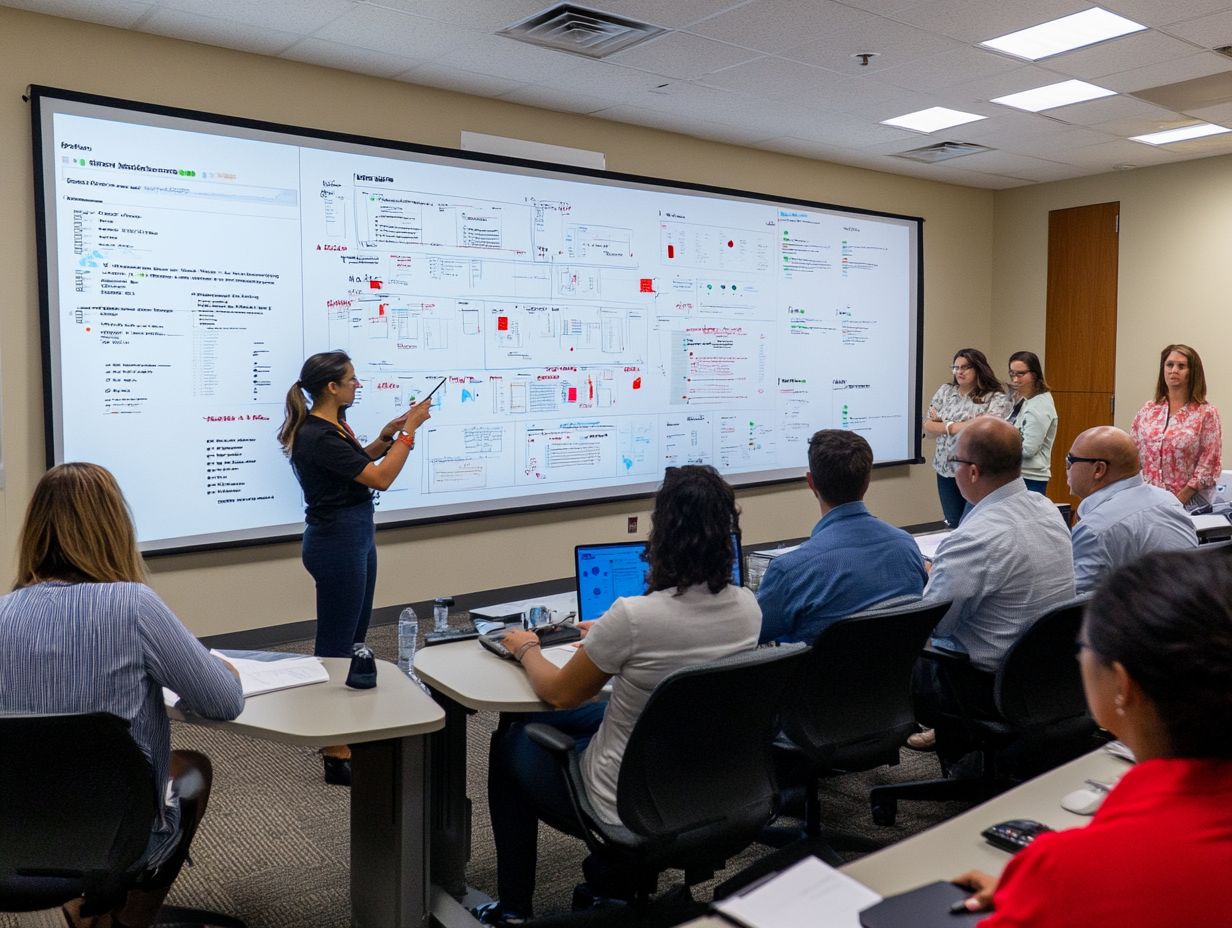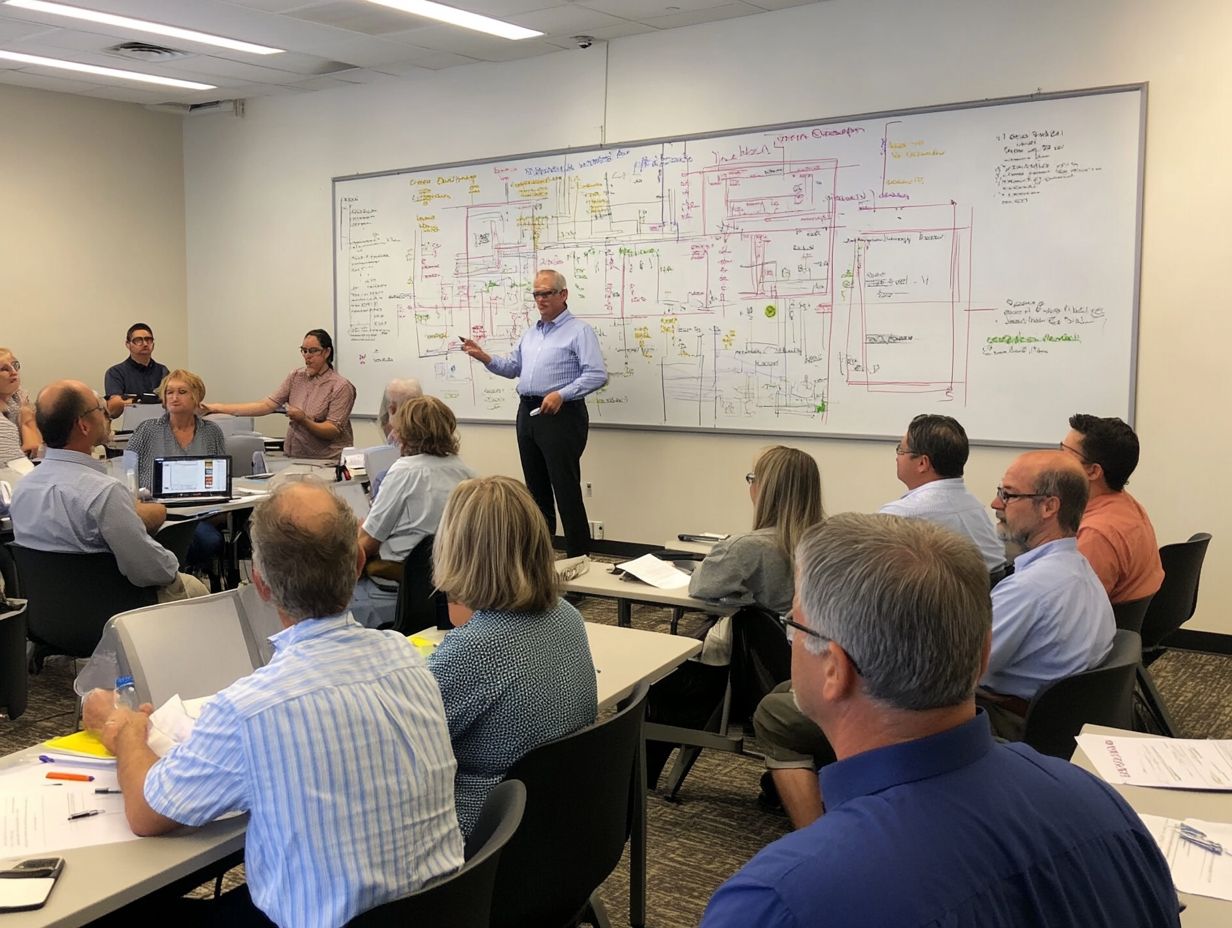What to Expect from Your PM Certification Training
In today s fast-paced business landscape, obtaining Project Management (PM) certification training is essential for professionals eager to enhance their expertise and elevate their career prospects.
This article delves into the myriad benefits of PM certification, offering insights for personal growth and employers on the lookout for skilled team members.
You ll find guidance on what to consider when selecting a program, an overview of the training involved, and a glimpse into the opportunities that await you after certification.
Dive in to uncover how PM certification can not only elevate your career but also significantly contribute to your organization’s success!
Contents
- Key Takeaways:
- Benefits of PM Certification Training
- What to Look for in a PM Certification Program
- What to Expect During PM Certification Training
- Post-Training Opportunities and Resources
- Frequently Asked Questions
- What to Expect from Your PM Certification Training?
- What type of certification can I expect to receive?
- Will the training prepare me for the certification exam?
- What are the prerequisites for PM certification training?
- How long does PM certification training typically take?
- What can I expect to gain from completing PM certification training?
Key Takeaways:

Enroll in a PM Certification Training program to gain essential skills and knowledge that will power your career forward! Employers benefit from trained PM professionals who can lead successful projects and contribute to company growth. Expect a well-structured course with interactive activities and assessments, as well as post-training opportunities for networking and continuing education.
What is PM Certification Training?
PM, or Project Management, involves planning and organizing resources to achieve specific goals. PM Certification Training is a structured program designed to equip you with essential project management skills and knowledge necessary for effective project governance.
This training often leads to the attainment of globally recognized certifications, such as the Project Management Professional (PMP) certification from the Project Management Institute (PMI).
You ll engage in a blend of theoretical learning and practical exercises, deepening your understanding of project management processes, methodologies, and best practices.
This training serves as your launchpad to an exciting career in project management, enhancing your job prospects across various industries.
By participating in online PMP courses and hands-on project management training programs, you will gain a comprehensive grasp of crucial skills, including:
- Risk management
- Stakeholder engagement
- Resource allocation
These courses are thoughtfully designed to fit into your busy schedule, allowing you to learn at your own pace while receiving insights from industry experts.
The significance of project management education is paramount; it not only prepares you for the rigorous PMP exam but also instills the confidence needed to lead teams effectively.
The PMI framework employed in these trainings emphasizes industry standards, ensuring you are well-equipped to navigate real-world challenges in your project management career.
Benefits of PM Certification Training
Dive into PM certification training and unlock incredible benefits for your career and your organization! Engaging in this training serves as a powerful catalyst for career advancement and professional growth.
As project management remains an essential skill across diverse industries such as information technology, construction, and health consultation gaining certification significantly boosts your job prospects and marketability.
Certified Project Managers often gain enhanced leadership abilities and superior project management skills, transforming them into invaluable assets within their organizations.
Advantages for Career Growth
One of the primary benefits of pursuing PM certification training is the significant career growth it can facilitate for you. Earning a PMP certification not only validates your knowledge but also opens doors to various career paths and advancement opportunities in competitive job markets.
The training equips you with essential project management concepts and methodologies, enabling you to navigate complex projects with confidence.
The structured nature of the certification program fosters a profound understanding of industry best practices and techniques, setting you apart from your peers and improving your chances of being selected for leadership roles.
Accumulating professional development units through this training showcases your commitment to continuous learning, a trait highly valued by employers. By actively pursuing the enhancement of your skills and qualifications, you position yourself favorably for promotions and new job opportunities, shaping a more robust career trajectory in the ever-evolving realm of project management.
Ready to take the next step in your career? Enroll in a PM certification program today and watch your future unfold!
Benefits for Employers
You stand to gain significantly when your staff participates in PM certification training, as it cultivates a workforce proficient in project management best practices that enhance overall team performance.
By hiring certified Project Managers, your organization can ensure that projects are delivered on time and within budget, while adhering to rules for managing projects. This training encourages continuous improvement and innovation, equipping your project teams with the skills necessary to manage complex deliverables effectively.
Certified professionals bring a standardized approach that minimizes risks and boosts stakeholder confidence. They adhere to best practices that enhance accountability, positively impacting project outcomes and enriching team dynamics.
Certified Project Managers promote better collaboration and communication among team members, resulting in increased morale and productivity. This cultivates an environment that embraces agility and adaptability.
Investing in PM certification training now can give you a crucial edge in today s competitive market, ensuring your projects align with strategic goals while improving compliance and governance throughout your organization.
What to Look for in a PM Certification Program

When you re choosing a PM certification program, it s essential to consider various factors that will significantly influence your project management education and career path.
The program’s credibility is paramount look for affiliations with reputable organizations like the Project Management Institute (PMI). Additionally, ensure the course content aligns with the exam content outline for the PMP exam and meets the educational requirements for certification.
Understanding the exam preparation resources available, including the exam structure and associated fees, is crucial. These details will enable you to make an informed decision.
Key Considerations for Choosing a Program
When choosing a PM certification program, it’s essential to evaluate several key considerations: the curriculum, the flexibility of training courses, and the availability of PMI membership benefits.
A thorough review of the course structure will help you determine if the program adequately covers critical project management concepts and methodologies, preparing you for the demands of the certification exam.
You should also consider the program’s format whether online or in-person based on your personal learning preferences and availability.
The reputation of the training provider is another crucial factor in the effectiveness of the education you receive. A well-regarded institution typically features experienced instructors who can share valuable insights from the field, enriching your learning experience.
Many programs offer networking opportunities and resources that come with PMI membership, connecting you to a broader professional community that can significantly enhance your career.
By considering all these factors holistically, you can achieve a comprehensive understanding of project management principles, ultimately shaping yourself into a competent project manager ready to tackle complex organizational challenges.
What to Expect During PM Certification Training
Get ready for an exciting journey during your PM certification training that combines theory with real-world application!
The program usually features a variety of modules that delve into essential topics like project governance, project deliverables, and compliance requirements, all designed to equip you thoroughly for the certification exam.
You ll find that interactive activities and assessments are woven into the training, providing you with hands-on experience that enhances your understanding and retention of the material.
Course Structure and Content
The course structure of your PM certification training is carefully designed to cover various project management methodologies and best practices. You will engage with educational statistics and real-world case studies that illustrate key concepts, enhancing your comprehension.
This structured approach not only prepares you for the PMP exam but also lays a solid foundation for your future endeavors as a project manager.
Throughout the program, you will explore essential topics such as Agile methods, risk management, and stakeholder engagement. You will gain hands-on experience through interactive workshops and simulations.
By aligning the curriculum closely with Project Management Institute standards, it ensures a robust preparation strategy that mirrors real-life scenarios you ll encounter as a project manager.
Collaborative group projects will cultivate your teamwork skills, vital for success in any project-driven environment. This comprehensive framework enables you to excel in your certification and navigate complex projects with confidence and expertise.
Interactive Activities and Assessments
Interactive activities and assessments are essential components of PM certification training, offering you the chance to gain practical experience in applying project management tools and techniques to real-world scenarios.
These activities encourage collaboration with your peers, enhancing both team performance and communication skills crucial attributes for any successful project manager. Through simulations, case studies, and group projects, you can sharpen your leadership abilities and deepen your understanding of project management processes.
The hands-on nature of these exercises invites you to engage in critical thinking and problem-solving, both vital for navigating complex projects. You ll receive immediate feedback, creating a learning environment that fosters continuous improvement.
This blend of theory and practice ensures that you grasp fundamental concepts and learn how to adapt these principles to different situations. As a result, these interactive methods significantly enhance knowledge retention, equipping you with the competencies needed to tackle real-world challenges effectively.
Post-Training Opportunities and Resources

Unlock your potential with essential post-training opportunities and resources! After completing your PM certification training, these resources significantly contribute to your ongoing professional development and career success.
Engaging in networking events such as PMI membership gatherings, workshops, and online forums allows you to connect with industry peers, share valuable experiences, and explore potential job prospects.
Pursuing continuing education and acquiring Professional Development Units (PDUs) will enhance your credentials and help you maintain your certification status.
Networking and Career Advancement
Networking plays a vital role in your career advancement after completing PM certification training. It cultivates connections within the project management community and unlocks new opportunities.
By joining the Project Management Institute (PMI), you gain access to an extensive network of professionals, resources, and events that encourage meaningful interactions and collaborations.
When you actively participate in discussions and networking events, you can share insights and acquire industry knowledge. This helps you explore job prospects that align perfectly with your skills and experience.
For effective networking, it s essential to approach these events with a genuine interest in learning and connecting. Engage in conversations, pose insightful questions, and follow up with contacts. This deepens your relationships and paves the way for significant career advancements in the field of project management.
Continuing Education and Professional Development
Continuing education is essential for project managers who want to remain relevant and competitive in the ever-evolving world of project management. It enriches your skill set and expands your knowledge base.
Engaging in professional development activities, such as workshops, seminars, and additional project management training, allows you to earn credits required to maintain your certification. This commitment to lifelong learning showcases your dedication to the profession and significantly boosts your marketability.
For example, specialized courses in agile methodologies, risk management, or advanced leadership can help you tackle complex projects with greater confidence.
These educational events often offer valuable networking opportunities, allowing you to connect with fellow professionals and industry leaders. This enriches your learning experience and opens doors to potential collaborations and job opportunities.
By prioritizing ongoing training, you cultivate a robust understanding of emerging trends and best practices, ensuring you remain an effective leader poised to drive project success across diverse environments.
Frequently Asked Questions
In this section, we address some common questions regarding PM certification training.
What to Expect from Your PM Certification Training?
During your PM certification training, you can expect to gain a comprehensive understanding of project management principles and methodologies, along with the skills and tools necessary to manage projects successfully.
What type of certification can I expect to receive?

After completing your PM certification training, you can expect to receive a globally recognized certification, such as PMP (Project Management Professional) or CAPM (Certified Associate in Project Management) from reputable organizations like PMI (Project Management Institute) or IPMA (International Project Management Association).
Will the training prepare me for the certification exam?
Yes, PM certification training is designed to prepare you for the certification exam by covering all necessary topics and providing practice questions and simulations. However, it’s important to study and prepare on your own as well.
What are the prerequisites for PM certification training?
The prerequisites may vary depending on the specific certification you are pursuing. Generally, you will need a certain number of hours of project management experience and education, along with completing the required training or courses.
How long does PM certification training typically take?
The duration of PM certification training can vary depending on the program and your pace. Typically, it ranges from a few days for intensive bootcamp-style training to several weeks or even months for a comprehensive program.
What can I expect to gain from completing PM certification training?
By completing PM certification training, you can expect to gain valuable project management knowledge and skills recognized globally. This can open up new career opportunities, increase your earning potential, and enhance your credibility as a project manager.






